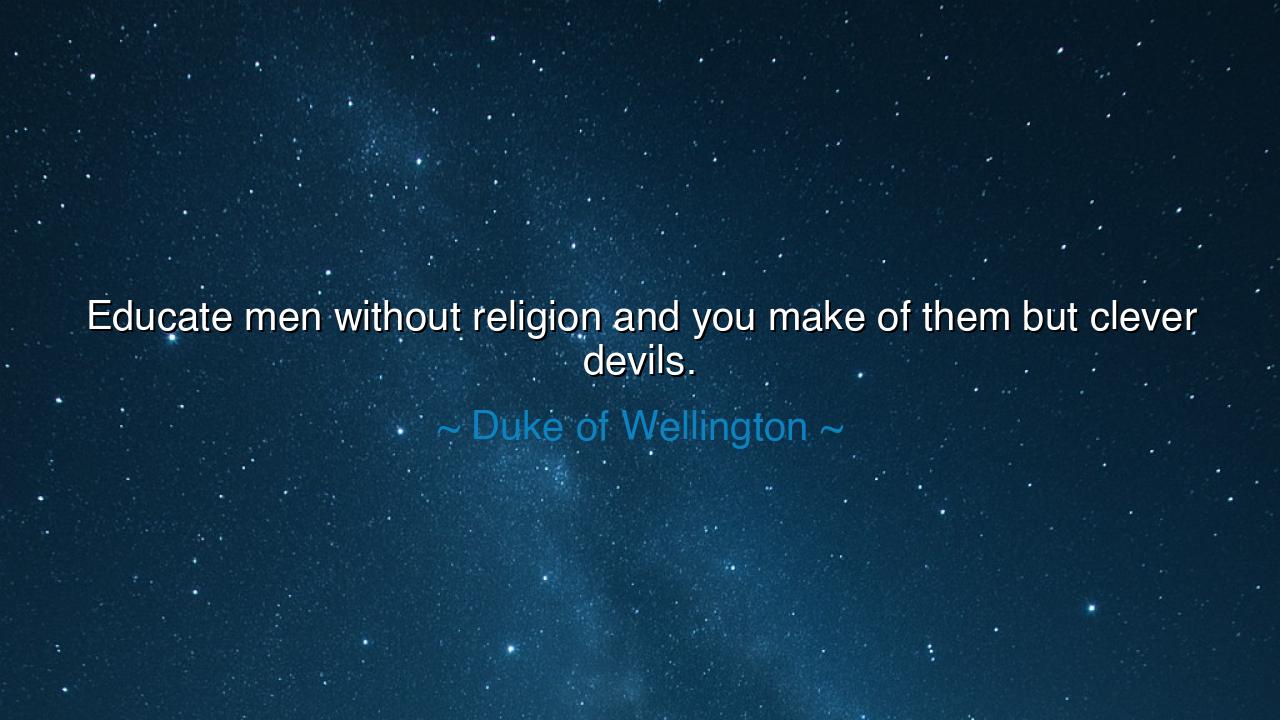
Educate men without religion and you make of them but clever






“Educate men without religion and you make of them but clever devils.” — thus spoke Arthur Wellesley, the Duke of Wellington, the Iron Duke who broke Napoleon at Waterloo. Yet these words, stern and heavy with moral weight, were not spoken from the mouth of a soldier alone, but from the heart of a man who understood the deep frailty of human nature. His victories on the battlefield gave him no illusions about the human spirit. He saw that knowledge without conscience is a sword without a hilt — sharp, brilliant, and deadly to the one who wields it. In this saying, the Duke warns that education, though noble, can become dangerous when divorced from moral grounding and the reverence for something higher than self.
In the ancient world, this truth was known to the philosophers and prophets alike. The Greeks taught that wisdom without virtue is ruin, and the Hebrews declared that “the fear of the Lord is the beginning of knowledge.” To educate the mind and neglect the soul is to build a palace upon sand — splendid, but doomed to collapse. The Duke of Wellington had seen this truth not in books, but in men: generals who were brilliant tacticians yet cruel beyond measure, scholars who could reason with precision yet lived without mercy, statesmen who could govern empires yet could not rule their own passions. To such men, education becomes an instrument of destruction, for without moral compass, intellect becomes a tool for deceit and domination.
Consider the story of Germany in the early twentieth century — a nation of poets, scientists, and philosophers, home to some of the most advanced minds of the modern world. Yet within a single generation, it descended into the darkness of tyranny and genocide. How could a people so educated commit horrors so vast? The answer lies in Wellington’s warning: they had cultivated intellect without moral restraint, knowledge without humility before the sacred. Their science served cruelty; their reason justified hatred. They became, in the Duke’s words, clever devils — brilliant, capable, but spiritually dead.
The Duke of Wellington, though a man of war, was not glorifying religion as superstition or ritual. Rather, he understood it as the moral anchor that restrains the destructive impulses of the human heart. Religion, in its purest sense, calls man to accountability beyond himself — to justice, compassion, and truth. Without such an anchor, knowledge becomes arrogance, and progress becomes peril. As the ancient sage Confucius once said, “Virtue without instruction is weak; instruction without virtue is dangerous.” Both must grow together, or humanity devours itself.
Yet this saying also carries a deeper and more compassionate wisdom: that education must touch both mind and heart. To learn facts without learning empathy is to become efficient but empty; to master logic without mastering kindness is to lose the essence of what makes us human. The Duke’s words remind us that civilization depends not on cleverness, but on character. A clever man may build machines, but only a good man can build peace. A clever man may win wars, but only a virtuous one can heal them.
So then, what is the lesson for those who walk the earth in search of wisdom? It is this: seek knowledge, but wed it to conscience. Let your intellect be sharp, but let your heart be soft. Question boldly, but never forget the sacredness of life. Let your education refine your compassion as much as your reason. For the greatest danger of enlightenment is pride — the belief that knowledge alone can save us. It cannot. Without love, knowledge turns to ice; without reverence, power corrupts; without humility, genius becomes madness.
Therefore, dear soul, let your learning serve the good. Read deeply, think freely, and question all things — but do so with humility before the mystery of life. Remember that the mind is a lamp, but it is the spirit that gives it light. The Duke of Wellington’s warning is not against intelligence, but against arrogance; not against learning, but against learning without love. For to educate without virtue is to create cleverness without wisdom, brilliance without mercy, and progress without peace. And in such a world, the devils would wear the faces of men.






AAdministratorAdministrator
Welcome, honored guests. Please leave a comment, we will respond soon